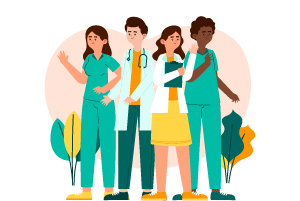Frequently Asked Questions
Questions and answers
Access to health services in the official language of one’s choice can be a determining factor in improving a patient’s health conditions and encouraging him or her to take better care of him or herself. Numerous studies confirm the importance of language in effective care and prevention. Culture (including language) is one of the 12 recognized determinants of health.
Research shows that the provision of health services in a language other than the mother tongue remains an obstacle to maintaining and improving the health status of minority communities.
When health services are not available in the patient’s mother tongue, consultation times are longer, medical tests are more numerous, the likelihood of misdiagnosis and treatment is greater, and there is a greater risk that the patient will not comply with treatment.
Ontario’s Francophone community is a linguistic minority within the larger Ontario and Canadian society, and this minority status influences its experience of the Ontario health care system, where it often does not have access to the same quality of care as Anglophones.
Experience shows that Francophones do not always request services in French, even if the provider has put these services in place. The weak sense of belonging of Francophones in Ontario partly explains this phenomenon of disengagement and assimilation, which is closely linked to the minority situation of Francophones in Ontario.
In addition to the complexity of the sense of belonging and the minority situation, there is the factor of the diversity of the Francophone community in Ontario.
Ontario’s Francophones share the French language, but the Franco-Ontarian community is marked by diversity: in ethnicity, religion, origin, education, culture, income, values and experience.
The French Language Services Act (R.S.O. 1990, CHAPTER F.32) prescribes the provision of and right to French language services in Ontario. Among other things, it stipulates that the Government of Ontario is responsible for providing services in French. It also provides for the right to speak in either official language during parliamentary debates.
The Act guarantees the right to address a provincial government, or a service provider on behalf of the provincial government (e.g., Service Ontario outlets), in French and to receive services in that language in one of the 26 designated regions.
To be designated, a region of Ontario must have at least 10% Francophones, or at least 5,000 Francophones in urban centres.
In the territory that Entity 3 serves, only the municipalities of Toronto, Mississauga and Brampton are designated. Oakville, Orangeville, Caledon or Shelburne are not located in designated areas.
The French Language Services Act does not require all health care facilities in Ontario to provide health care services in French. Only institutions that have obtained formal designation are required to offer services in French. Those that are identified must provide minimal support, and will only be required to offer services in French once they have obtained designated institution status.
A planning entity is a body appointed by the Ontario Ministry of Health to identify the needs and priorities of the Francophone community in order to make recommendations to health system authorities such as Ontario Health on all health issues affecting the Francophone community in a given region.
The appointed body may take on other mandates in the health field. It can be given assignments and can apply for or receive financial support from various donors.
The Ministry has designated six (6) entities in Ontario. Each entity has a mandate to advise one Health Ontario region (or two or three LHINs until recently). The entities are funded by the Ministry of Health.
Entity 3 regularly issues recommendation reports to health system authorities such as Health Ontario. These recommendations are intended to improve health services for the Francophone population in the territory served and are as targeted as possible.
Three categories of recommendations can be retained:
- We recommend the development and implementation of an approach appropriate to the situation of Francophones in our territory (e.g., promoting and expanding the active offer of health services in French as much as possible).
- Improvements to existing services (e.g., inclusion of a French lens or provision of service in French for existing virtual medicine tools).
- The implementation of initiatives or projects to respond to needs that we have identified in the community (for example, proposing the establishment of a round table to study a specific subject).
Organizations that provide public services may be identified by the Ministries of Health and Long-Term Care. These organizations are required to provide minimum support, such as interpretation and cultural competency training for their staff, to ensure the quality of services provided. An identified organization is one that may be on its way to eventual designation.
Designation is the legal recognition by the Ontario government of an organization’s ability to provide services in French. Designated organizations are required to provide services in French in the same way as departments.
To be designated, an organization must meet the following conditions:
- To offer quality French language services on an ongoing basis;
- Guarantee the accessibility of its services in French ;
- Have Francophones on the organization’s board of directors and management ;
- Develop a written French language services policy, adopted by the Board of Directors, that defines the organization’s responsibilities with respect to French language services.
The designation may be total for the entire organization or partial for a specific service or program.
In 2019, the Ontario government has decided to reform the health care system. The Population Health Services Act, 2019 received Royal Assent on April 18, 2019 and creates the Health Ontario agency, whose mandate includes implementing health system strategies developed by the ministry. The goal of this reform is to create a new model of integrated health care delivery that puts each patient at the centre of an interconnected system of care. To do this, Ontario Health Teams (OHTs) have been and continue to be established across Ontario. With HCAs, health care providers (including hospitals, physicians, and home and community care providers) now work as coordinated teams – regardless of where they provide care. These SOAs can be organized as they wish and can be run by hospitals.
Yes, it is the same organization. The 6 entities created in 2010 had been numbered, and our organization was then called Entity 3. Shortly after its creation, Entity 3 changed its name to Reflet Salvéo.
Due to recent changes, Reflet Salvéo has reverted to its original name of Entity 3.
Do you have another question? Do not hesitate.
Address
Toronto, ON M5E 1E5

























